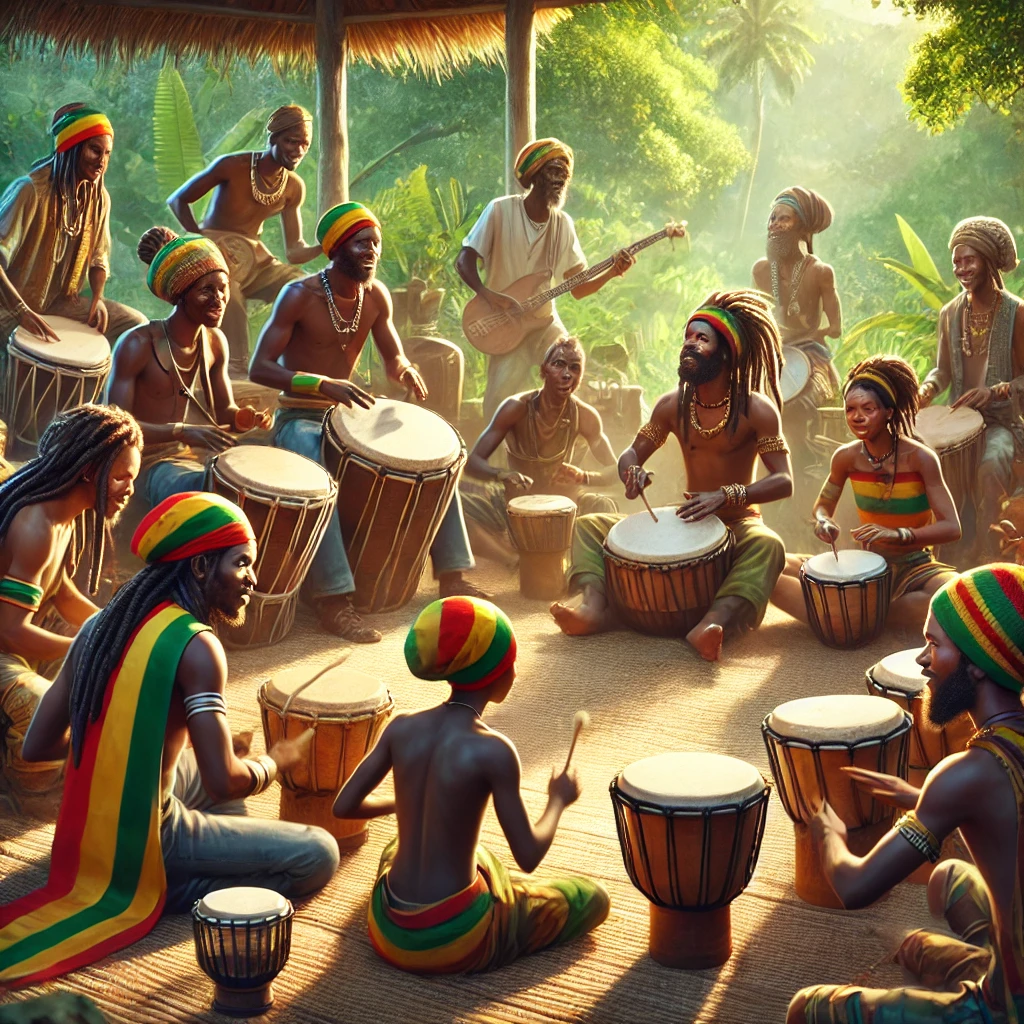Bless up, my brethren and sistren! Today, we a go explore di powerful role of drumming in Rastafarian culture. Drumming is not just about making music; it’s a spiritual practice, a way to connect with Jah, and a vital part of our cultural heritage.
The Spiritual Connection
Drumming holds a special place in Rastafarian rituals and gatherings. The rhythmic beats of di drum are believed to carry spiritual energy, connecting di drummers and listeners to Jah. Each beat serves as a call to unity and a reminder of our African roots.
Nyabinghi Drumming
One of di most important forms of drumming in Rastafarian culture is Nyabinghi drumming. Named after Queen Nyabinghi, an African warrior queen, dis style of drumming is integral to Rastafarian ceremonies. Nyabinghi drumming sessions, known as grounations, are spiritual gatherings where brethren and sistren come together to chant, pray, and drum.
Types of Drums
Several types of drums are used in Rastafarian drumming, each with its unique sound and purpose. The three main types of Nyabinghi drums are:
The Bass Drum
The bass drum, also known as the “Pope Smasher,” provides the deep, resonant foundation of the rhythm. It represents the heartbeat of di earth and is played with a steady, pulsing beat.
The Funde Drum
The funde drum keeps the rhythm steady, playing a syncopated beat that complements the bass drum. Its role is to maintain the groove and drive the music forward.
The Repeater Drum
The repeater drum, also called the “Akete,” is the lead drum. It plays intricate, improvised patterns, adding complexity and excitement to the rhythm. The repeater drum is often used to communicate spiritual messages and enhance the overall energy of the drumming session.
The Role of Drumming in Ceremonies
Drumming is central to many Rastafarian ceremonies, including celebrations, worship, and protests. It serves as a means of expression and communication, bringing people together in a shared spiritual experience.
Celebrations
Drumming is a key element in Rastafarian celebrations, such as the birthday of Haile Selassie I, Emancipation Day, and Grounation Day. The powerful rhythms create a joyful atmosphere, encouraging dancing and singing.
Worship
In Rastafarian worship, drumming is used to honor Jah and seek spiritual guidance. The rhythmic beats help participants enter a meditative state, enhancing their connection to the divine. Drumming sessions often include chanting and prayers, creating a holistic worship experience.
Protests and Resistance
Drumming has also been a powerful tool of resistance and protest throughout Rastafarian history. It serves as a call to action, rallying people to stand up against oppression and injustice. The rhythmic power of the drums can inspire courage and unity, making it an essential part of Rastafarian activism.
Drumming as Cultural Preservation
Drumming plays a crucial role in preserving Rastafarian culture and passing it on to future generations. By teaching the art of drumming to young people, Rastafarians ensure that their traditions and values continue to thrive. Drumming workshops and community gatherings provide opportunities for cultural exchange and learning.
Teaching the Youth
Elders and experienced drummers often take on the role of teachers, passing on their knowledge and skills to the younger generation. This mentorship ensures that the art of drumming remains alive and vibrant within the community.
Community Bonding
Drumming also fosters a sense of community and belonging. It brings people together, creating bonds of friendship and solidarity. Through drumming, individuals connect with their cultural heritage and with each other, strengthening the fabric of the Rastafarian community.
Conclusion
Drumming is more than just a musical practice in Rastafarian culture; it is a spiritual, cultural, and communal experience. The powerful rhythms of the drums connect us to our roots, our faith, and each other. By honoring and preserving the art of drumming, Rastafarians keep their traditions alive and continue to inspire positive change. One love!

